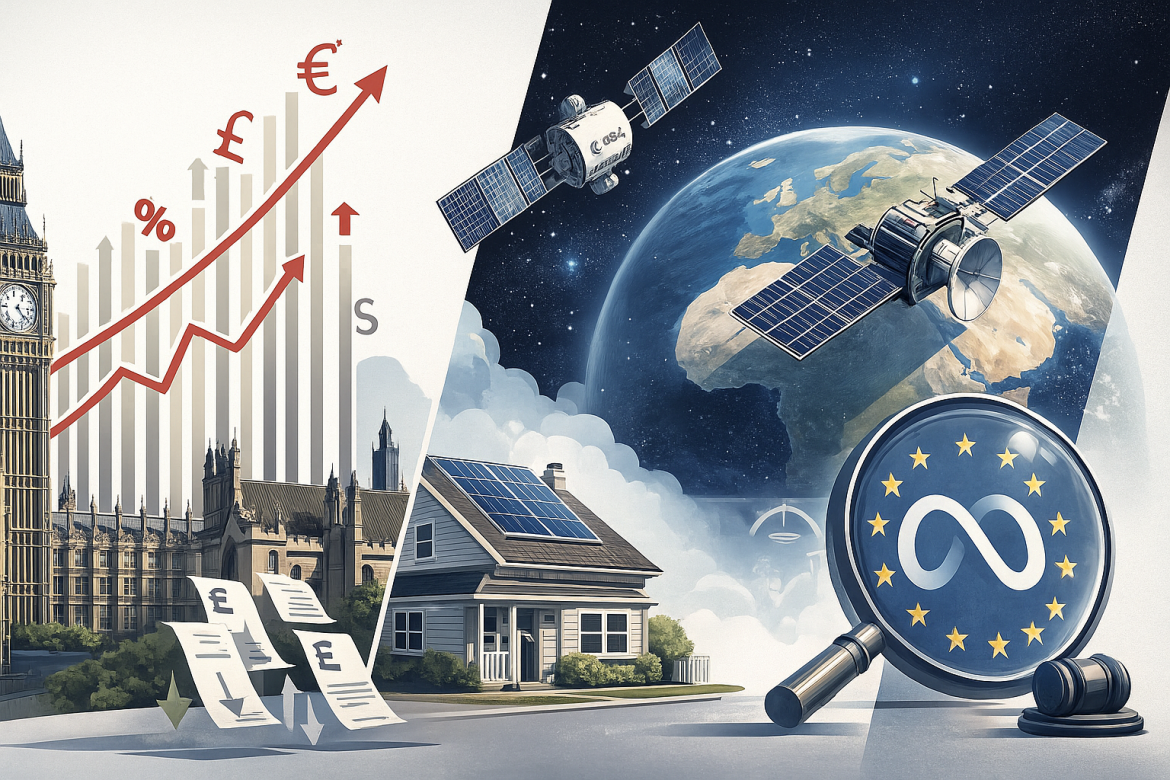UK politics and European policy are shifting fast, with big moves reshaping economic strategy, energy affordability, defense ambitions, and tech regulation.
Rachel Reeves’ tax-heavy budget is testing investor confidence, while a new government plan promises relief through lower household energy bills.
The European Space Agency is pushing into military territory for the first time, seeking major funding for defense-focused space assets.
And Meta’s clash with EU antitrust regulators highlights escalating tensions between Big Tech and European oversight.
A glance at the major developments in Europe today.
Reeves unveils major tax hikes
UK Chancellor Rachel Reeves has rolled out a budget packed with significant tax hikes, all aimed at boosting public spending and reassuring the markets.
It’s a bold move, and it’s definitely testing how much confidence investors have in the new Labour government’s ability to manage the economy.
A big chunk of these tax increases is aimed at high earners and corporations, which has sparked plenty of debate about whether this could make the UK less attractive for investment.
Reeves is walking a tightrope here; she needs to raise enough revenue to keep the country on a sustainable fiscal path, but without slowing down business activity or hurting economic growth.
UK cuts household energy bills
The UK government just announced a new policy that will cut household energy bills by around £150 a year, a welcome bit of relief with inflation and energy prices still putting pressure on families.
It’s part of a bigger push to make energy more affordable, encourage cleaner power, and give extra support to people who need it most.
To make this happen, the government is rolling out a mix of regulatory changes, subsidies, and fresh investment in renewable energy infrastructure.
ESA seeks major military pivot
The European Space Agency is asking for a massive budget increase, €22 billion over the next three years, which is about 36% more than before.
And what’s really notable is why: for the first time since its founding in 1975, the ESA is shifting toward military-focused space projects.
They’re proposing a €1.35 billion program to build military-grade reconnaissance satellites and secure communications systems. In other words, Europe wants its own high-end space intelligence tools instead of relying on others.
This push fits into a bigger trend across the continent. European countries have been ramping up defense spending, hitting a record €343 billion in 2024, with projections showing that could rise to €381 billion in 2025.
A lot of this urgency comes from growing geopolitical tensions, especially Russia’s continued military actions.
By investing heavily in space defense, Europe is trying to boost its strategic independence and strengthen its ability to gather its own intelligence, monitor threats, and develop its own navigation and surveillance systems.
It’s a major turning point for an agency that’s always been mainly civilian.
Meta slams EU’s “aberrant” antitrust demands
Meta is pushing back hard against the European Union’s latest antitrust demands, calling them “aberrant” and basically accusing regulators of going way too far.
The EU is investigating whether Meta has been using Facebook’s massive trove of user data in ways that unfairly boost its digital advertising power.
Meta argues that the rules being proposed could seriously hurt innovation and make it harder for the company to operate.
On the other side, EU officials say this is all about ensuring fair competition and protecting user data, something they’ve been increasingly strict about in recent years.
This clash is another chapter in the ongoing struggle between Big Tech and European regulators.
And it’s not just about Meta: the outcome could shape future tech rules, influence US–EU regulatory alignment, and affect how digital markets are overseen going forward. The legal and economic implications are still very much up in the air.
The post Europe bulletin: UK tax hikes, ESA military pivot, Meta-EU clash shape the day appeared first on Invezz
